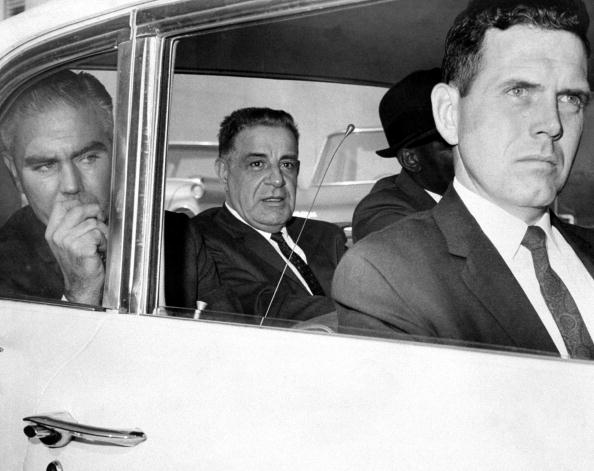Witness programme to break code of silence

Swiss police have launched the country’s first ever witness protection programme, especially aimed at cases related to human trafficking, terrorism and organised crime - but it will not be open to all-comers.
Running a witness protection programme would seem an obvious step for most law enforcement agencies. In the public conscience, it has become mainstream enough for Humphrey Bogart, Harrison Ford, Mel Gibson and Homer Simpson to portray it fictionally.
Yet in Switzerland there was nothing official until now, with any witness protection being carried out an ad hoc basis.
“We realised in recent years that for certain types of crime, it is very important to speak to some key people, and those people aren’t ready to talk if they have the impression that their lives or physical integrity are threatened,” said Federal Police Office director Jean-Luc Vez.
The new service set up by the federal police closes a legal loophole and allows Switzerland to fulfill its obligations under the Council of Europe Convention on Action against Trafficking in Human Beings, which the Swiss ratified late last year.
Federal and cantonal prosecutors are expected to file protection requests for ten to 15 cases per year, at a cost of around SFr2 million ($2.1 million), split equally between the cantons and the federal authorities. The federal police office will also advise the cantons for around 140 cases.
The final decision as to whether to provide protection ultimately lies with the office’s director. “It’s a heavy responsibility,” points out Vez. “I know that the person concerned could be killed.”

More
When the state hides its criminal citizens
New life
Witness protection will be restricted to cases involving human trafficking, terrorism and organised crime. So who will actually benefit? While ideally it would only be the witnesses themselves, it could also involve their children and partners.
In one fictional scenario envisaged by the police, the witness protection service would intervene to secure the testimony of Maria, a young Cuban mother forced by traffickers to prostitute herself in Zurich. Beaten up by pimps, she is ready to talk, but only if she feels safe.
In exchange for her testimony, the federal police could provide her with a new identity, a place to live, perhaps even outside the country, and could even ensure she is reunited with her young child who stayed behind in Cuba.
Earlier this year, the federal police’s annual report pointed out that investigations into suspected trafficking are difficult as victims are under severe pressure and therefore reluctant to report what has happened to them.
Victims’ associations have welcomed the implementation of the programme, considering it a good first step, even if they feel it could go further.
“We believe it should be a victim protection programme and not just aimed at witnesses,” said Doro Winkler of FIZ, an association providing support for migrant women and victims of trafficking. “Not all women who are victims are witnesses, or want to press charges or provide information, but all of them need protection.”
Winkler told swissinfo.ch victim protection is currently in the hands of civil society and the cantons. “What we do is not that different from the witness protection programme, but we have limited resources and possibilities for our work,” she added.
The dilemma and risks of agreeing to live under witness protection have been captured in film for decades now. They range from GoodFellas with Ray Liotta and Witness with Harrison Ford to Hugh Grant in the more recent Did you hear about the Morgans?
In the 1937 film Marked Woman, a crusading district attorney (Humphrey Bogart) persuades a club “party girl” (Bette Davis) to testify against her mobster boss after her innocent sister is accidentally murdered during one of the crime figure’s unsavoury “parties”.
Mary Dwight Strauber: Please don’t ask me to talk. He’ll kill me.
David Graham: Now you help me to prove that he was responsible for this and I’ll put him where he won’t kill anybody.
Mary Dwight Strauber: You don’t know what he’s like! He stops at nothing. People just disappear and are never heard of again. I don’t want that to happen to me.
Targeting the mafia
Switzerland is also a prime market for Italian crime syndicates, with the Calabrian ‘Ndrangheta at the forefront. According to the Federal Prosecutor’s Office, Switzerland is a sort of logistical platform where these organisations’ dirty money can be laundered –through banks and trustees as well as property investments.
The ‘Ndrangheta appears to have the strongest presence in the country and has been extending its sphere of influence further north in the past few years, a situation the authorities would like to counter through better intelligence, including finding better informants within criminal organisations and protecting them if need be.
“One of the rules of mafia organisations is that no one speaks,” Vez told swissinfo.ch. “If you want access to information about them, you have to find key people who can provide that information.”
The authorities are hoping the new programme will help reach breakthroughs for prosecutors, especially against organised crime. A number of cases have faltered in the courts in recent years despite all the work put in by the prosecution, resulting only in what is perceived as minor sentencing.
For Vez, it should make a difference. “It will certainly increase the efficiency of our investigations against these forms of criminality,” he added.
However, granting protection to mafia turncoats and their ilk will be carefully considered. Precious as they may be as witnesses for the prosecution, they will not be granted immunity for their own crimes.
The federal authorities are also at pains to point out that entering the witness protection programme does not free anyone from their obligations, financial or otherwise. This means no walking away without paying the bills.
Cost will be another factor that come into play when deciding whether a person is placed under protection. The federal police say it will cost between SFr5,000 and SFr150,000 for each case.
“There could be times where we will have to refuse to take on a case,” admitted Vez, but said this would also mean foregoing having a witness for the prosecution.
While few details are available, the whole programme is extremely complex in its setup, requiring collaboration between the federal and cantonal police forces, prosecutors, civil authorities and even foreign governments in some cases.
According to Vez, one of the biggest challenges will be keeping the process under wraps.
“It is important that each authority involved in the process realises this information must remain secret,” he said. “If anything regarding these programmes is leaked, the witnesses themselves are in danger.”
The law governing the new witness protection programme was approved by parliament in 2011 and came into force on January 1, 2013.
It is expected to cost SFr2 million per year, with the federal authorities and the cantons equally sharing the financial burden. Each canton will pay based on its population.
The programme will provide protection to witnesses following a demand by cantonal prosecutors, the final decision lying with the head of the Federal Police Office.
Protection is terminated if there is no longer any discernible threat or if the protected person repeatedly violates the terms of the agreement with the authorities, making it impossible to guarantee any form of protection or the safety of the security staff. Protection can also be ended if the witness specifically requests it.
Legislative changes notably include the possibility for foreign witnesses to stay in another canton to the one where they are legally resident, as well as allowing witnesses from foreign protection programmes to seek shelter in Switzerland.

In compliance with the JTI standards
More: SWI swissinfo.ch certified by the Journalism Trust Initiative











You can find an overview of ongoing debates with our journalists here . Please join us!
If you want to start a conversation about a topic raised in this article or want to report factual errors, email us at english@swissinfo.ch.